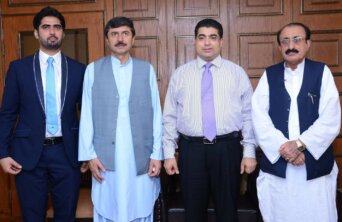- About
- Topics
- Picks
- Audio
- Story
- In-Depth
- Opinion
- News
- Donate
- Signup for our newsletterOur Editors' Best Picks.Send
Read, Debate: Engage.
| topic: | Political violence |
|---|---|
| located: | Pakistan |
| editor: | Shadi Khan Saif |
By ignoring the calls for a probe of the suspicious death of former Senator and democracy champion Usman Khan Kakar, and by blocking media coverage of his funeral, the government of Pakistan’s security forces had raised the price for political dissidence to new and lethal heights.
Senator Usman Kakar was a member of the upper house of parliament in Pakistan, representing his constituency in the marginalised Baluchistan province, up until his suspicious death, or murder as his son Khushal Kakar calls it, earlier this week.
Usman Lala, as his followers have referred to him out of respect, had stated quite frankly on the floor of the parliament that intelligence agencies were threatening him due to his open calls for democracy and citizens’ rights in a country with a known track-record of military interference in civilian affairs.
The long-neglected Baluchistan province saw hundreds of thousands of Kakar’s supporters turn-up for his funeral prayers with strong slogans against the military establishment. But following evident pressure by those in power, the public and private media were barred from covering this show of solidarity and dissident.
Not a single leading news organisation dared to cover such a large crowd that clearly held the deep state forces accountable for the alleged killing of Senator Kakar.
The troubling trend of stifling dissent has gained momentum under the rule of Prime Minister Imran Khan, the sportsman-turned-politician widely seen as the apple of the powerful army’s eye. This clearly demonstrates that the state prioritises pride, prejudice and jingoism over democraic principles with open space for debate and free press.
Ali Wazir, another elected public representative from the devastated tribal belt, has been in chains since December 2020 for an alleged speech he delivered against the state.
This has not been the first time that dissident politicians like Wazir and his allies in the Pashtun Tahafuz Movement (PTM) have been brazenly reminded by the all-powerful army in Pakistan about the consequences of challenging it.
The lawmaker has repeatedly rejected the sedition charges levelled against him in connection with a political rally, and insists upon his right to free speech.
The PTM is a rights-based association that has been rather fiercely calling for the de-mining of the tribal areas and demanding an end to the practices of extrajudicial killings, enforced disappearances, cross-border terrorism and unlawful detentions by the security and spy agencies of the Pashtuns in Pakistan.
Ironically, actions that actually defame Pakistan in the global arena but are framed as messages of ‘pride and success’ by other politicians, most of whom are in the government, result in patronage and promotion.
Last year, for instance, Federal Minister of Information and Broadcasting Fawad Chaudhry had said that Pakistan was involved in an armed attack on Indian security forces in Kashmir that left 40 people dead, and brought the two nuclear-armed neighbours to the brink of war.
However, since Chaudhry framed his statements in a manner that glorified the Pakistani government, he remains a favorite among the establishment.
This, combined with the continued blackout PTM faces in the local media, demonstrates that democracy in Pakistan is absent, and that the country is practically under the rule of the deep state.
Image: UPF International.

